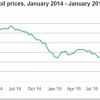Global oil price slump and Bangladesh

Iranians have reason to be jubilant. Sanctions in place since 2006 have been lifted. Economic sanctions had been placed progressively by the US, EU and the UN in response to that country's nuclear programme. For Iran, it means the US repaying Iran an estimated US$400 million in funds frozen since 1981 plus interest worth $1.3 billion. It means nearly $100 billion of Iranian assets that were frozen are now unfrozen. But more importantly, a sanction-free Iran is now expected to double its oil export to 1.1 million barrels of crude oil and a further 500,000 barrels soon afterwards.
When we think of the impact of the re-emergence of Iran as a major oil exporting nation, the incoming Iranian crude spells trouble for existing oil producing nations ranging from the Kingdom of Saudi Arabia (KSA), Venezuela, Brazil and Russia and a further slump in oil prices from the current sub-$30 per barrel is expected. It is of course very good news for major oil-guzzling Asian nations such as China and India. Indeed going by what has been published in international media, both these countries and others like Japan and South Korea are all lining up with Tehran to ink oil-import deals.
With an unfettered Iran to sell as much crude oil it wants, it will inevitably push prices downwards, because the country intends to produce and sell up to 2.5 million barrels of oil per day by next year. Iran has been marketing its oil aggressively. It intends to provide discounts to old customers, which will only intensify the downward price spiral of oil. KSA will be forced to match dollar per dollar in discounts if it wishes to match deal-sweeteners that Tehran will offer. It is impossible to predict how much further the price of oil will go down, but even a blind man can see that prices are on their way down in the international oil markets.
In the midst of all this of course, we are stuck with a price regime in Bangladesh that has been oblivious to what is going on in the rest of the world. The incessant foot dragging by the government on revising downward oil prices is simply unrealistic. The favourite argument dished out on a regular basis by officials and ministers alike is that since BPC has, over the years, sustained losses, it is now making up for lost revenue. It is disheartening to note that the government in all practicality does not have a clear policy on fuel price adjustment. Had we had one in place, then it could lead to a situation where domestic fuel prices would be adjusted to revision in prices in line with the trends in the international markets. In this age of oil glut and record low prices, precisely what the government has been doing to increase its capacity to store more oil and increase its refining capacity is anyone's guess. Since, the original short-term plan to produce electricity by employing rental/quick rental power plants that run on furnace oil has now literally become our long-term future, would it not make more sense for us build up our storage and refining capacity, so that Bangladesh may build up its stocks of crude oil, in the event, that we may take advantage of going into long-term contracts with countries like Iran? Building up such stock of the precious liquid at discounted prices should not be taken lightly, especially in light of the heightened tensions between KSA and Iran.
As per a projection put forward recently by the country's leading think-tank, the Centre for Policy Dialogue (CPD), we find that a 10 percent reduction in fuel prices could propel the country's GDP growth rate by 0.3 percent, or in dollar terms, nearly $5.2 billion; raise its export earnings by another 0.4 percent and household consumption by about 0.6 percent. Those are serious numbers. A reduction in domestic fuel pricing would have a chain reaction (positively) leading to a reduction in cost of living for consumers, already hard pressed with inflation on house rent, food, transportation to school fees. A general reduction, if necessary, in phases of litre of diesel and kerosene would certainly go a long way in reducing the per unit cost of electricity generation and aid in lowering the levy charged by transportation companies on the transportation of goods over the road network.
At the end of the day, Iran's re-entry into the world of oil should be welcome news for oil-consuming countries. It has been welcomed by major Asian economies. Indeed, China which is the world's biggest importer of oil from the Middle East has taken notice and the Premier Xi Jinping is making a visit to the region and Tehran is on the list of stoppages. The message is loud and clear: low oil prices are here to stay. The question is what are we going to do about it?
The writer is Assistant Editor, The Daily Star.

 For all latest news, follow The Daily Star's Google News channel.
For all latest news, follow The Daily Star's Google News channel. 








Comments